
Comedian George Carlin said, “Men are from Earth, women are from Earth. Deal with it.”
That’s a hard pill to swallow sometimes, isn’t it? Compare a male and female of any other species on the planet… Sure, there are some biological differences – like a male dog humping everything in sight – but when the doorbell rings, a dog barks at the door, regardless of its genitals.
People, though… Well, we’re different from other species. Men and women respond differently to their environments (have you ever watched a sappy movie with your partner?), and they also have some different needs. But folks of both genders have a lot of similarities as well: they want to be liked, accepted and respected.
Here’s why you give a damn: Women held just 23.6% of jobs in the motor vehicles and motor vehicles equipment manufacturing industry in 2019. Even more damning? Only 1% of positions for collision repair technicians and 1.4% of automotive service technician positions were filled by women.
And it’s not because women can’t do the job – I mean, seriously, have you seen some of these badasses?!
An industry in desperate need of qualified technicians and other personnel cannot afford to alienate half the population right out of the gate!
To celebrate Women’s History Month, we’re giving you some insights into the Dirty Little Secrets of the Automotive & Skilled Trades Industries. We hope you’ll stick around for the ride – learn a little, laugh a little and hopefully find something that resonates!
Guys, we know you have questions – cheers 🥂to that infamous female intuition! – so we’re going to take a stab at answering them in the FAQs at the bottom of this post.
And hey ladies – although a lot of this series is addressed to the men for simplicity’s sake, this isn’t merely a “men” problem. There’s a lot of girl-on-girl crime going on in this industry (you just earned extra cool points if you get the reference)… as women, we can all do a better job of supporting one another. “Just laugh it off” only ensures that our daughters and even granddaughters are still dealing with the same bullshit – and they don’t have our sense of humor! They’re already fed up; they were BORN fed up.
In honor of Women’s History Month, Femcanic Garage and Chasidy Rae Sisk Writing & Communications are partnering each Wednesday in March to bring you the Dirty Little Secrets of the Automotive & Skilled Labor Trades Industries.
This series features many voices, not just ours. Women in the automotive industry have graciously shared their stories**, and we’ve done our best to bring as much information and resources together as possible. We want to dive into those real, raw, taboo topics – the subjects that make you shush your friends if they speak too loudly in public – and we’ll share them through text, audio and imagery because people are diverse and everyone digests information differently – and that’s okay!
We’ll share our thoughts, too, because we want you to understand: This isn’t just a “them” problem, an “over there” problem – it’s a problem impacting you, impacting ALL of us, a problem that’s taking place RIGHT HERE, everywhere, and if we don’t break out of our comfort zones and start talking about these not-so-sexy secrets, nothing will ever change.
But more importantly, we’ll add our voices to the many women who’ve shared their stories because we owe them that. We owe them the added strength of our voices – we are stronger together, and unless we begin to address this as an industry and as a society, our daughters will be sharing these same stories 20 years down the road. We welcome you to this journey and are so excited you’ve decided to join us– women and other minorities need the support of strong allies and industry leadership to solve these problems.
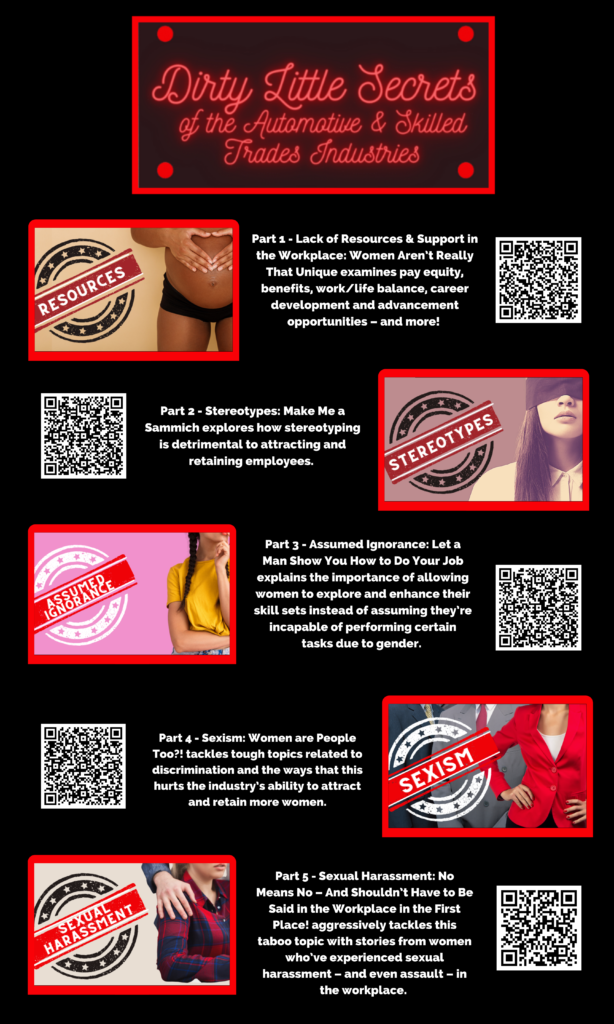
Other industries have made significant strides when it comes to tackling similar concerns, proving that improvement IS possible. We believe it’s past time for the automotive and skilled labor trades industries to have this conversation.
Now, buckle up for a whirlwind of misplaced gender roles, disturbing tales from the frontlines and a good hearty helping of brutal honesty. But before we dive in, a quick note to the gents and the ladies…
Men: We understand that you’re probably a little reluctant to confront this, and it’s awesome that you’re still with us – we promise we aren’t here to attack you. Now, we may challenge some ideas that have been instilled in you and offer suggestions you haven’t considered, but it’s coming from a place of love and faith that you’re open, that you’re ready to have this conversation, that you’re prepared to participate in making this world a better place for all people. We know you have only the best intentions, but who hasn’t unintentionally offended someone? Let’s talk about some things you may not have thought of before and how these “women’s rights” issues impact you, too!
Women: For those of you who have faced gender discrimination or any of discrimination’s other ugly faces, we are here with you. We hear you. We see you. We believe you. To the rest of you, we know that not every woman feels oppressed – and we’re glad if you’re among that demographic. Keep on rocking! But a diamond doesn’t shine any less brightly because it’s surrounded by other diamonds… Help one another. Mentor each other. Let’s support ALL the badass women in the automotive and skilled labor trades industries!

So, I taught myself to backstitch!” Mark told his best friend when they were 12 years old; Brandon responded, “DUDE! What kind of homo are you?!” Although Mark didn’t mention his love for sewing again until many years later, he spent his free time practicing different techniques. He dreamed of being a fashion designer – but straight men didn’t do shit like that.
Mark studied automotive repair at his local vo-tech high school, and he got a great job in a shop after graduation. He wasn’t in love with his job, and when he told his girlfriend, Amber, about his passion for sewing a few years later, she emailed him a job posting for an automotive interior upholstery expert! Mark found a career that he loves – and he doesn’t get called a “fag” at every family holiday event since he’s still in a field for manly men.
Alright folks, it’s the fourth week of this, and if you haven’t read the content/trigger warning since week 1 (or never read it), we are going to request that you take a peek because shit’s about to get real. We’re hitting this head-on: SEXISM.
Sexism (noun): 1. prejudice or discrimination based on sex, especially: discrimination against women. 2. Behaviors, conditions, or attitudes that foster stereotypes of social roles based on sex.
“Man is defined as a human being and a woman as a female – whenever she behaves as a human being, she is said to imitate the male.”
Here’s the thing about sexism – it’s such a pervasive part of our heritage, our culture, our society, that most of us don’t even notice when it happens. Yeah, sure, of course, we notice the big stuff. Most of the quotes we’re sharing here are the obvious examples. We aren’t going to dive into the little stuff, not this time around, but we’re mentioning it here because it’s something to keep in mind:
For every “bitch,” “cunt,” or “suck my dick” that a woman hears in the workplace, there are dozens, maybe even hundreds, of microaggressions that plague her day-in, day-out. Some women stick it out, grow a thicker skin. Others quit. Death from a thousand cuts.
This article contains a great explanation of the differences between overt, covert and subtle sexism.
“What’s the worst possible thing you can call a woman? Don’t hold back, now. You’re probably thinking of words like slut, whore, bitch, cunt (I told you not to hold back!), skank. Okay, now, what are the worst things you can call a guy? Fag, girl, bitch, pussy. I’ve even heard the term ‘mangina.’ Notice anything? The worst thing you can call a girl is a girl. The worst thing you can call a guy is a girl. Being a woman is the ultimate insult. Now tell me that’s not royally fucked up.”
But sexism happens to men too! Yes, it does. And we believe that’s complete bullshit, too. While 81% of surveyed women reported being victims of sexist jokes in the workplace, 63% of men also indicated feelings of unease when comments were made about their physical appearance (source).
And society is rife with examples of covert and subtle sexism that harms men: alimony, custody of children, corporal punishment, the acceptance of violence, and even the tolerance of prison rape. While women benefit from these instances of sexism in some cases, they are not the ones perpetuating the discrimination –
“When men suffer from sexism, then, they do so in much the same way women do. That is, they suffer not because women rule the world and are targeting men, nor because feminism has somehow triumphed and brainwashed all of our elected officials (most of them still men) into ideological misandry. Rather, men suffer because of the same gender role stereotypes that hurt and restrict women—though men, being of a different gender, fall afoul of those stereotypes in different ways. Women are supposed to be passive and domestic and sexual—so their employment options and autonomy are restricted and they are fetishized and targeted for sexual assault and exploitation. Men are supposed to be active and violent—so their claims to domestic rights are denigrated and violence directed against them is shrugged off as natural or non-notable” (source).
These inequities which harm men carry over from the cultural notion that a woman belongs in the home… an ideal that dates back to the days when women didn’t work outside the home, let alone have a successful career of her own. Feminists have fought against this stereotype for decades.
And research proves that most men do not agree with sexism. Research conducted by Catalyst indicates that 86% of men are personally committed to interrupting sexist behaviors when they see them at work! That’s awesome! What’s not so awesome? Only 31% feel confident in their ability to speak up, particularly in organizational climates where silence is the norm – Sound like any industries you might belong to?
“I have a sexual discrimination case against my old employer if that tells ya anything… I started off as an apprentice, worked there for two years and then (after I had been pushing for it for some time), they promoted me to flat rate. It started out okay, but they started to skip me for tickets and take my work… I was making substantially less than anyone else there because they refused to give me bigger jobs, even though I was just as capable and qualified as everyone else. That went on for MONTHS. I spoke up multiple times, but nothing got better. One day, they tried to pass this big truck off on me – the person who was next in line didn’t want it, and when I questioned them, they fired me. I had to deal with all kinds of shit on the regular there. The guys have multiple stalls in their bathrooms and a changing room too – the shop was made for them – but the women’s bathroom is just a private bathroom, so the guys kept sneaking in there to poop and would DESTROY the bathroom so I wasn’t able to go when I needed to. I asked everyone nicely to stop, but they didn’t. I put signs up, and they ripped them down… I taped them back up and then they covered the “wo” part of “women” so that it read ‘men.'”
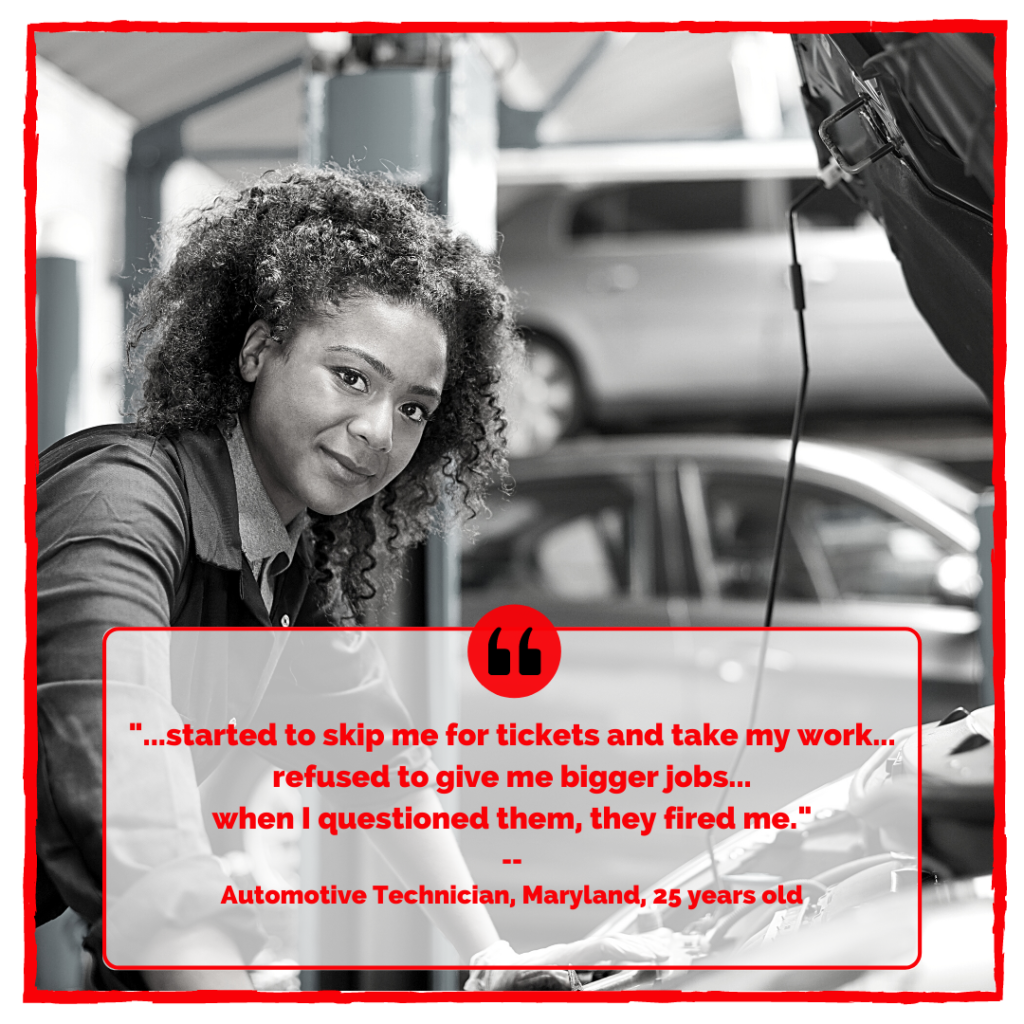
S o, our Maryland friend is brave. She experienced sexism, and she called it out. And she was fired. And we wonder why women are reluctant to share their experiences with misogyny?
While sexism pervades the automotive industry 65% of women have been asked to perform lower level tasks, like note-taking and ordering food, which their male counterparts are not asked to do, nearly 30% believe the “automotive industry is no more sexist than any other industry;” 56% disagree. Nearly 80% of women have witnessed sexist behavior (from either gender) at industry conferences or off-site company gathering – at least once. Over 40% have witnessed it on multiple occasions (source).
Compared to 5% of men, 16% of women are subject to microaggressions at work (source). If you don’t know what microaggressions are, read about them here. But what microaggressions result in? Silence. Fear. Withdrawal.
Although most women experience subtle sexist behaviors on a regular basis, women have been programmed to ignore them, shrug them off, not make a fuss. Women who object to this treatment are subject to retaliation: criticism, threats, job loss, violence. Crybaby. Bitch. Slut. (Yeah, somehow it always comes back to that. Woman spills a glass of milk, and suddenly she’s sleeping with the whole damn neighborhood! *Sigh*)
According to this Forbes article, “When we call out sexism, it’s easy to be seen as shrill or preachy. ‘Crying sexism is essentially victimizing yourself,’ [writer Rachel Balik said], and in [male-dominated] industries like tech, that’s never a good position to be in. Instead, stress that any discriminating language, boy-girl-black-white-rich-poor, is simply uncool. Doing so with a ‘tough’ demeanor so as not to ‘scare’ the men with your feminine ways might also be key.” So, in order to be taken seriously, act like a man? Cool
“When handing out my resumes, one guy told me he “would never hire a girl to do a man’s job” and then proceeded to throw my resume in the garbage. I picked it out and told him I wouldn’t want to work for a piece of shit like him anyways. And thanks for letting me know what kind of person he was beforehand. I had been shot down so many times that day I was done being nice.”
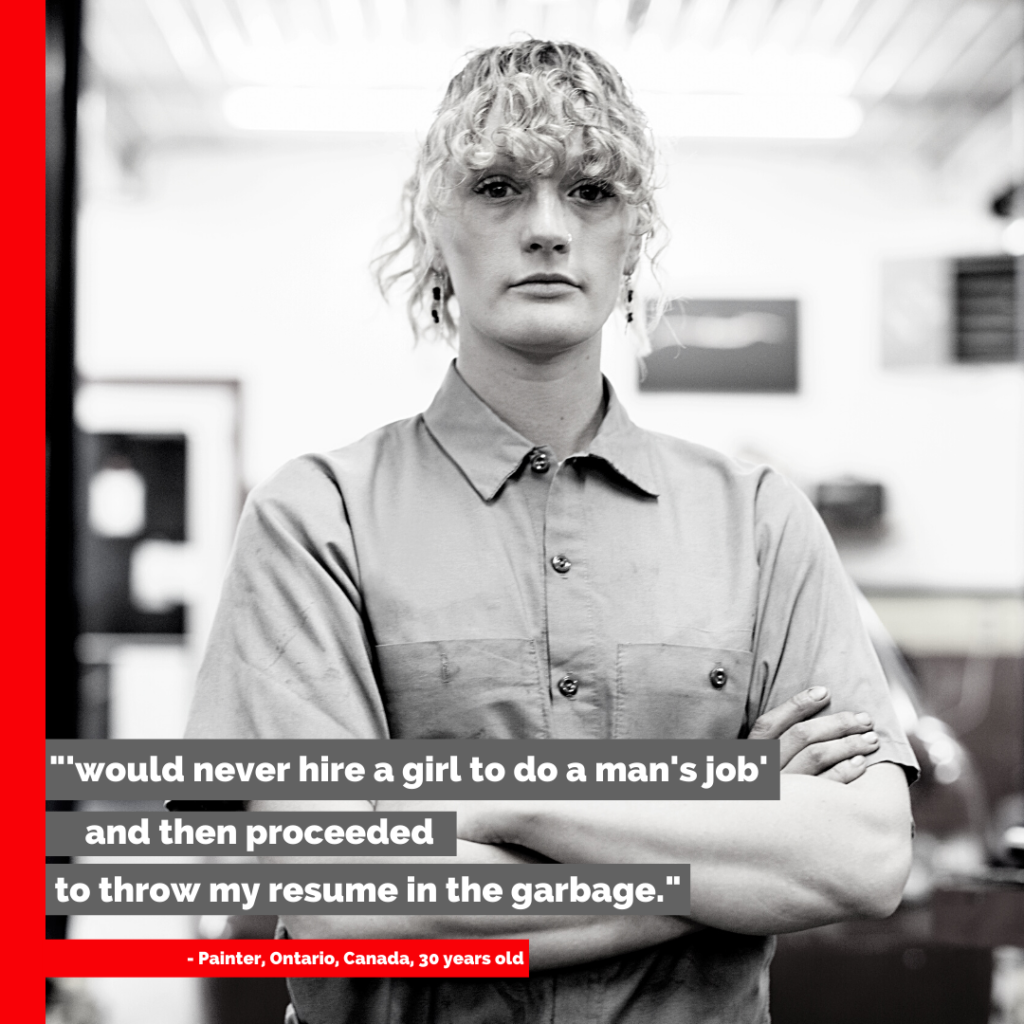
S o, here’s a great example of the difference between diversity and inclusion. Folks get hung up on diversity because they’re worried that someone less qualified might get the job they want – because of their gender, skin color, etc. Ontario up here wasn’t looking to be hired because she was a woman. She was an automotive professional seeking a job.
Inclusion. When you INCLUDE every qualified candidate – regardless of gender, race or anything other than their education and/or skills – diversity happens naturally.
Now, let’s talk about this from another perspective: the female consumer’s. As a business, you need to sell – products, services, whatever. But people don’t buy those things. People buy people. And 90% of women surveyed by the Car Care Council in 2016 believed that “auto repair shop operators treat them differently because they’re women” (source).
Think about the businesses you’re uncomfortable walking into. Are those businesses that employ people who don’t look or think like you? It’s even more unnerving in a situation where you feel vulnerable, after an auto accident when you need to have your car repaired, for example. You want to feel safe, and being talked down to probably isn’t going to make you feel safe.
Female consumers ARE (basically) the consumer market. In the United States, women make or influence 83% of all purchases, including more than 80% of car purchases. They buy 65% of all new cars and 45% of light trucks and SUVs, plus they order 65% of all service work. Yet, three-quarters of women feel misunderstood by car marketers. “Make sure your dealership is welcoming women — not only as customers, but also as employees” (source).
The Global Leadership Forecast Study 2018 found companies with increased gender diversity and female representation are 1.4 times more likely to have sustained profitable growth (source).
“My tech school, who was also a manager at a big local collision shop, told me (in front of my classmates): “I’d never hire a woman, regardless of her talents, because of the distraction it would cause and the possibility of a lawsuit.” There have been many others, but that one stung the most because it almost made me quit. I’m glad I didn’t – I’ve been doing this for ten years now.”
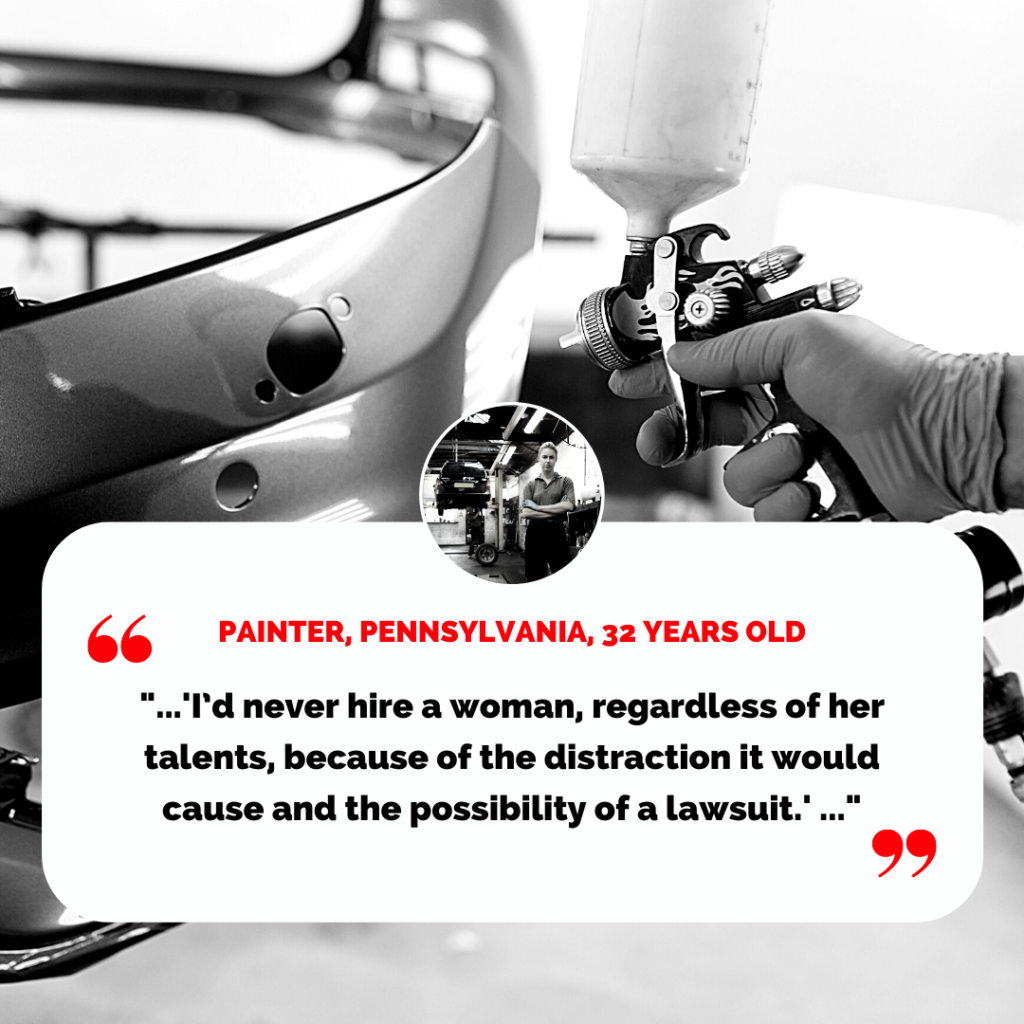
Let me point something out real quick – at industry conferences and training events, we talk a lot about attracting young people to the industry, how to engage them. But when we have that discussion, we are generally talking about young MEN, not young women. Because if we are going to talk about attracting young WOMEN to the automotive and skilled labor trades industry, we have to start by addressing the elephant in the room – sexism.
Why do we have to address sexism with this new generation when we didn’t address it with the ones who came before? Older gals know how to take a joke. These little girls are too uptight. No, they were just born to women who were already fed up; those women had mothers who were sick of it all, which they’d learned as the daughters or granddaughters of women who were barely considered human.
Now, is a lawsuit a genuine fear business owners have? Of course, it is, and with good reason. Last year alone (2020), 11,497 charges alleging sex-based harassment were filed with the EEOC, resulting in more than $65 million in settlements – and that doesn’t even include the charges filed with their Fair Employment Practice agency partners! The bulk of those (6,587) were charges for sexual harassment allegations, but we’ll get into that next week (source).
First off, those numbers represent a small percentage of women who experience sex-based harassment. The number who don’t report is astronomical. There are 69.23 million EMPLOYED women in the United States, so if we assume that all of these charges were brought by women (which is NOT accurate), that would mean that 1.66% brought charges. Yet, 42% of working women in the U. S. have experienced covert gender discrimination at work in eight specific categories, as outlined in this article. Subtle sexism, the kind that all women experience at some point in their lifetime, isn’t even a consideration in this context.
OK, also – let’s point out that obvious. Numero uno: Stop punishing the victim! Numero dos: Address the problem; check the Resources section for some companies that offer free or low-cost training on addressing unconscious bias.
But really, this teacher opened himself up to a lawsuit anyway, by opening his bigoted mouth. Because “I wouldn’t hire a woman” is sexism, folks. And it seems to be an all-too common occurrence. While 4% of men are rejected from jobs, women are rejected at nearly double that rate (7%) (source), which is even crazier since women must be more certain that they meet the qualifications of a job posting before they’ll even apply! (We talked about that last week in case you missed it.)
“‘You’re only liked and get big jobs because you’re something to look at.’ – Never mind I could do big jobs in half the time it took them! Same things when I was promoted to painter – only because I’m something to look at, seems like I can never win! The negative comments have always come from guys my age, never the older techs, but even though it’s hard, it’s definitely worth the bad days.”

T oxic masculinity (noun): a cultural concept of manliness that glorifies stoicism, strength, virility, and dominance, and that is socially maladaptive or harmful to mental health: Men and women both suffer when toxic masculinity perpetuates expectations that are restrictive and traumatizing.
There’s so much stupid controversary about this term… We’re going to take a minute here. The term “toxic masculinity” is not an attack against being a man; it’s perfectly fine to enjoy traditionally masculine things! Toxic masculinity is this hyper-machismo version of the “manliness” that some people, both male and female, believe to be indicative of a REAL MAN. “Toxic masculinity isn’t just about behaving like a man. Instead, it involves the extreme pressure some men may feel to act in a way that is actually harmful” (source).
It’s not having a beer with the guys, BBQing, hunting, fishing, growing a beard or enjoying traditionally masculine things. Toxic masculinity is treating women like sex objects. It’s using violence to resolve differences. It’s justifying men’s bad behavior with “boys will be boys.” It’s a denial of having emotions. It’s domestic violence, homophobia, sexism.
So, basically it’s that idea that, to be a MAN, you have to be the biggest, the strongest, the toughest guy out there. That’s bullshit, and it’s stupid. Here’s some examples of TV characters who demonstrate toxic traits, but if you check it out, you’ll notice that a lot of these guys are pretty likeable – except when they’re not. (Sidenote: “Sex Education” is a really cool teenybopper show that does a great job of addressing toxic masculinity and a lot of other sensitive topics.)
That’s one of the things that people forget when it comes to abusers: they can be very charming, which is why it’s so disarming when they’re not. We’re going to talk more about that next week in Sexual Harassment, but back to the topic at-hand.
Toxic masculinity is prevalent in male-dominated industries because when there’s one in a shop, it’s hard for the other guys to voice an objection (we’ll talk more about that in a bit). But what’s the effect?
Well, Chaya M. Milchtein shared her story in this article (which is definitely worth a read!), but here are some excerpts: “I loved my work, but hated the way my coworkers treated me… It didn’t matter their age, size, or position relative to mine, “baby” was mostly used as a way to infantilize and demean me… Many technicians have nude photographs hanging on their tool boxes. Each time I saw these photographs at work, I felt like a piece of meat—a person to be used sexually, but unworthy of being considered equal in the workplace. These small gestures add up. Women in the automotive repair industry are excluded from what is a boys club. Many leave. By 2018, after working as a service manager for three years at two different shops, I’d had enough. No job was worth the daily sexism.”
You can’t blame her; she’s right. Who wants to spend 40+ hours each week in a place where they’re constantly disrespected? Everyone deserves to be spoken to and treated with respect!
“I was told by my guidance counselor to put on a skirt and heels and go find an office job. Thirty-five years later, I fixed his Lexus at one of my shops, and he hugged me, saying he was never more proud – that I followed my dreams and not his advice.”
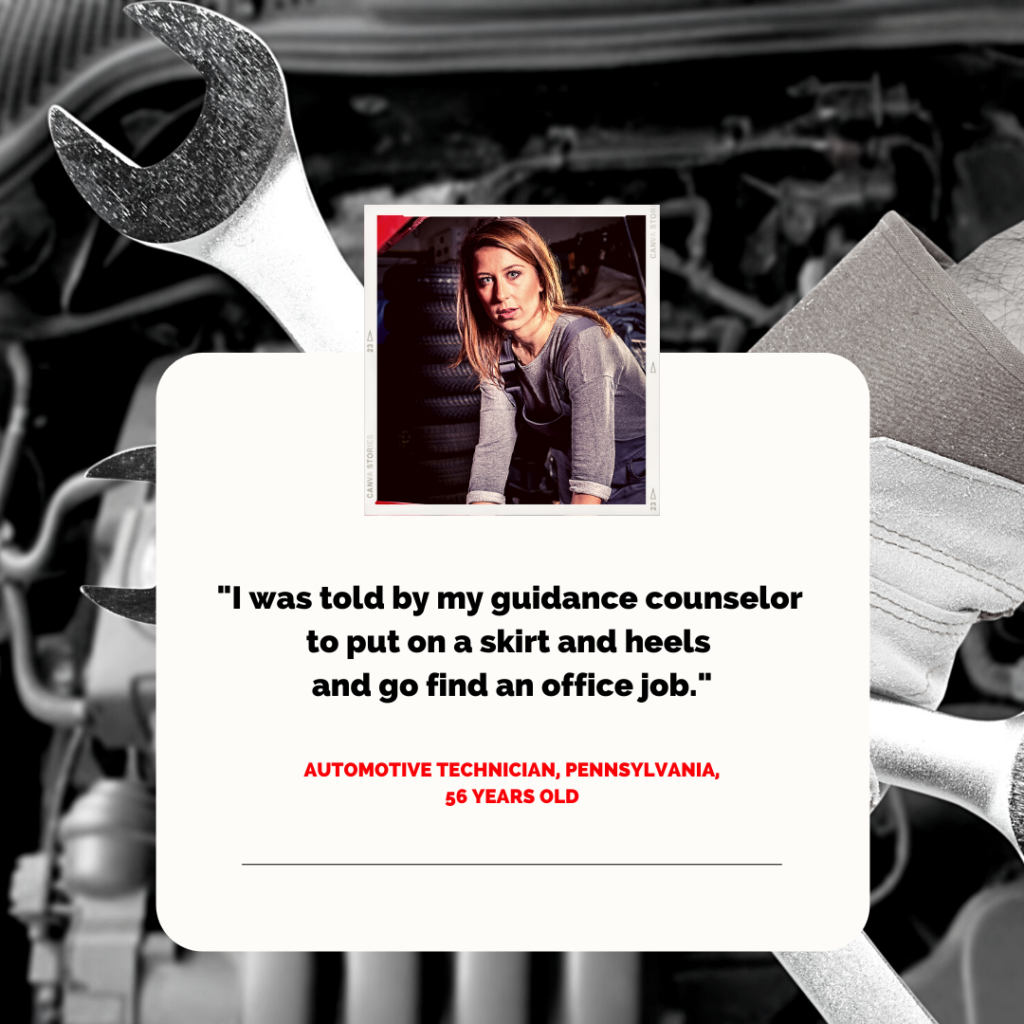
Yeah, she did! Yeah, he is! Okay, it’s awesome that she didn’t let her guidance counselor discourage her (though, I personally know that this is one tough lady). And it’s even more awesome that he eventually recognized that he was wrong. We’ve all been wrong; we’ve all changed as we’ve grown.
It’s time for the industry to grow, too. In their September 2020 survey, Deloitte and Automotive News asked over 700 automotive professionals, “Have you seen positive changes in the automotive industry’s attitude toward female professional employees in the last five years?” While 64% of men have seen some/significant positive change, just 39% of women felt the same; conversely, 35% of women report little change or worsening conditions, while only 13% of men believe it’s gotten worse.
So, who’s right? Well, who experiences the industry’s attitude toward females? Women do. Do things change, maybe even progress? Sure, thankfully, but slowly. So when things like #metoo happen, most guys check their behavior because they are open to learning (or maybe motivated by fear), but while comments may have been toned down, the implication is still there… maybe the complaint is now “ugh, chicks” instead of “fucking bitches!” But let’s also please acknowledge that the real bastards out there – they’ve been flying under the radar for years, and they continue to do it.
People often blame their bigotry on “how they were raised,” but that’s a pretty lame excuse. Are you telling me that you’ve never found a better way to do something as you got older? You’ve never found a new tool or new information that helped make you better, at something? Of course, you have – you’re a smart person, constantly seeking to improve yourself!
When an old way of doing something no longer serves you best, you unlearn it – and you learn something new. That’s what our society needs to do with sexism (and racism and homophobia and all bigotry). Let’s start here, though. Unlearn sexism; learn equality. The benefits of equality between the genders are numerous – for everyone.
“If you stand for equality, then you’re a feminist. Sorry to tell you.”
We cannot talk about women’s rights and experiences without mentioning the rights and experiences of transgender and non-binary people, as well. Reminder: People deserve to be treated with respect. They deserve to be accepted for who they are. They deserve to be safe. They deserve to BE, to exist. Period. If you need to educate yourself on how to be supportive of transgender people, read this or this.
While we have not yet had the opportunity to talk to any transgender or non-binary folks in the industry (but we would love to – hit us up!!) to share their experiences, a 36-year-old transgender woman (a woman who was assigned male at birth) from Florida shared her introduction to sexism as a female-presenting person. “At the beginning of my transition, I was working in retail, interacting with a lot of customers. Looking from down the aisle back then, I might have just appeared to be a gay emo boy with long hair, form-fitting clothes, and a touch of makeup. However, after months of estrogen, my body shop began to feminize, and my chest had a bit of observable curviness.”
“As that happened, it dawned on me that the ways in which customers called out to get my attention were becoming on average a bit less respectful – I had a sudden first-person awareness of the difference in how women and female-presenting people were treated, compared to men and male-presenting people. When I looked like a girlish boy, I was very rarely talked down to, but now that I looked like a boyish girl, I heard condescending tones more often. It’s odd to me that most people seemed to have no idea they were talking that way,” she said.
“I was simultaneously filled with excitement that I was starting to be seen as the woman I am… as well as a crushing sadness for how society teaches people to talk to women.”
An article published in “TIME” magazine also provides an interesting perspective on sexism, from the eyes of a transgender man (a man who was assigned female at birth).
Exploring how “experiences of trans men can provide a unique window into how gender functions in American society,” writer Charlotte Alter recounted her findings after over two dozen interviews with trans men and activists: “Over and over again, men who were raised and socialized as female described all the ways they were treated differently as soon as the world perceived them as male. They gained professional respect, but lost intimacy. They exuded authority, but caused fear. [They] reiterated how fundamentally different it is to experience the world as a man…Cultural sexism is often more visible to trans men, because most say they find it easier to be low-disclosure than trans women.”
Please, take a second and imagine being in that situation: How would you feel if you were suddenly treated differently by strangers, acquaintances, friends, even family – just because you wanted to be who you already are? Maybe you gained or lost some hair or fat… don’t we all do that during our lifetimes anyway? And whether I shave or not is none of your damn business, unless you’re in my bed (and even then, eh, I’ll take it under advisement), but I’m going to offer a suggestion that will bring you so much peace: stop worrying so much about what other people are doing with their own bodies or in their bedrooms. It’s none of your business.
The TIME article continued: “[Many] had no idea how rough women at work had it until they transitioned. As soon as they came out as men, they found their missteps minimized and their successes amplified. Often, they say, their words carried more weight: They seemed to gain authority and professional respect overnight. They also saw confirmation of the sexist attitudes they had long suspected: They recalled hearing female colleagues belittled by male bosses, or female job applicants called names.”
Others told Alter about male co-workers sexualizing female colleagues when women weren’t present, while James Gardner noted one of the professional benefits of maleness: “I don’t get as many calls to James correcting me. I’m the same person, but the men are less critical of James.”
There’s another side to transitioning though, because as a man, trans men are now viewed as threats. Tiq Milan told Alter: “If I start to get too close, I can feel her fear, I can feel that she’s getting upset. And it’s really just an indication of how dangerous this world is for women.” (If you don’t understand why men are viewed as a threat, stay tuned for the final installment of the Dirty Little Secrets of the Automotive and Skill Labor Trades Industries – Sexual Harassment, to be released on March 31st, 2021.)
You know that sexism is wrong. You do. And it’s also counterproductive to a healthy working environment. When women work in male-dominated environments, their most common coping mechanisms are “Distancing themselves from colleagues, especially other women; Accepting masculine cultural norms and acting like ‘one of the boys,’ which exacerbates the problem by contributing to the normalization of this culture; [and] Leaving the industry” (source).
Gender discrimination is also illegal, yet it’s prevalent in our society. “While initially these laws primarily protected women in the workplace, they are also designed to protect individuals who are discriminated against because of gender identity, including transgender status, and sexual orientation. In these times when non-heterosexual individuals are provided with the same protections as heterosexuals, equal employment laws apply to them as well” (source).
Now, obviously, sexism isn’t a problem that only impacts the automotive and skilled labor trades industries – it has infested society as a whole. But this is a great industry, filled with great people. We can do better; we can join progress and innovation – something this industry is pretty accustomed to. And we can make a better future – both in the industry and for our children. Sexism has a wide reach and a significant impact – on women and on men, on girls and boys, on everyone.
“Courage is like a muscle. We strengthen it by use.”
“Not only can women help to fill the thousands of open positions [in the automotive industry], but they can also become spokespeople and refer friends, family, and community to the career opportunities the automotive industry has to offer. Nude calendars and the bro club aren’t worth keeping women out” (source).
“Regardless of who is the subject of the joke or remark, all workers should be treated equally and deserve respect based on their level of skill and not their gender. Employers should act as advocates of the workplace culture, demonstrating that no form of sexism will be tolerated whether that is an indecent remark, joke or assigning tasks based on ridiculous notions of what a man or woman can do. Employers and management should use their platforms to see that sexism in the workplace becomes a thing of the past, creating a positive outlook for the future of business” (source).
Not all men. Absolutely not all men. But most men prefer staying silent, rather than challenging other men – but those misogynist men are never going to listen to a woman’s opinion! Here are some tips on how to talk to men about sexism and sexist behavior:
There are many resources available on the topic of sexism which enables you to educate yourself, but if you’re interested in educating your staff so that you’ll be more comfortable hiring a diverse workforce without fear, these companies offer “Unconscious Bias” training that users can access at little to no cost:
Want to read more about how hiring more women can benefit your automotive business?
If you want to learn more about Toxic Masculinity, here are a couple articles to check out:
And here are some organizations that may be able to provide useful information:
If you’re experiencing sex-based discrimination in the workplace, you can file a complaint here.
Jayme and Chasidy are the HBICs (Head Bitch in Charge) of Femcanic Garage and Chasidy Rae Sisk Writing & Communications, respectively.
Femcanic Garage is “a community of like-minded women in the skilled-trades, automotive, and motorsports industries. Through our shared accomplishments, careers, and dreams, we elevate and empower each other to realize our highest potential. Together, we strive to smash stereotypes and break barriers for women in the industry and evolve the world to see us as the leaders that we are.” To Jayme, Femcanic is all about “creating a global space for women in this industry, an industry a lot of women love.”
Chasidy Rae Sisk Writing & Communications is a freelance writing operation that provides content and copywriting, predominantly to the automotive and collision repair industries.
We are women. We are feminists. We think this industry offers awesome career options for some really amazing people, but we also believe that the sexism and misogyny that pervades our society plays a role in some of the automotive industry’s challenges. And we have faith that we can do better.
@ Feminism is not a dirty word, though the stigma against it makes me hesitant to type it, reluctant to own the label – even though I’ve always believed in equality. But I’m not ashamed to be a feminist; I am who I am, and I am someone who believes in equality, someone who is wholeheartedly convinced that my genitals do not prevent me (or anyone else) from being who I want to be – and that includes pursuing the career, hobbies or anything else I so choose. I AM a feminist.
Feminism (noun): belief in and advocacy of the political, economic, and social equality of the sexes expressed especially through organized activity on behalf of women’s rights and interests (source).
Note how it says equality, rather than subjugation. Feminists aren’t trying to become the ruling gender; leaders should be elected based on knowledge and skills, including interpersonal “soft” skills, rather than on whether they have a penis or a vagina.
But here’s another perspective on what feminism COULD mean – if gender equality is embraced.
In an industry that accepts women’s equality and promotes diversity, women will no longer feel pressured to become one of the guys to fit in. Each woman will be able to “stop trying to be a second-class man and be a first-class woman.”
Women will be able to own the fact that, yes, we are women, and yes, we are a minority in this industry – but we won’t have to try to be anything other than the woman each of us already is.
What if being a feminist simply meant embracing and falling in love with your own version of femininity? There’s a gentleness that’s often inherent in women, and tragically, it’s frequently suppressed in male-dominated industries where to be a woman is to be “less than.”
But being a woman is a gift, and that softness is part of what makes women so special. Being a badass in the shop doesn’t have to prevent you from showing your heart of gold – and that also applies to men. Men are allowed to have – and express – emotions, too!
Inequality hurts ALL people – men, women, black, white, LGBTQIA (Lesbian, Gay, Bisexual, Trans, Queer/Questioning, Intersex, Asexual), or heterosexual. It sets up a system where everyone is told what they can do, who they can be, how high they can reach.
So why is no one talking about it? Sure, some people don’t recognize it’s even happening, especially people who’ve never experienced or witnessed it – after all, how do you explain color to the blind, right?
But there’s a larger reason: FEAR. We (as individuals, as women and as people in general) are afraid. We’re afraid of how we’ll be perceived if we call out bad behavior, if we set standards for how we’ll be treated, if we demand equality.
And we’re afraid for good reason. The history books are full of martyrs who stood up for what was right – only to be knocked down and persecuted. No one wants to lose their career because they “can’t take a joke.” Never mind that the joke stopped being funny long ago.
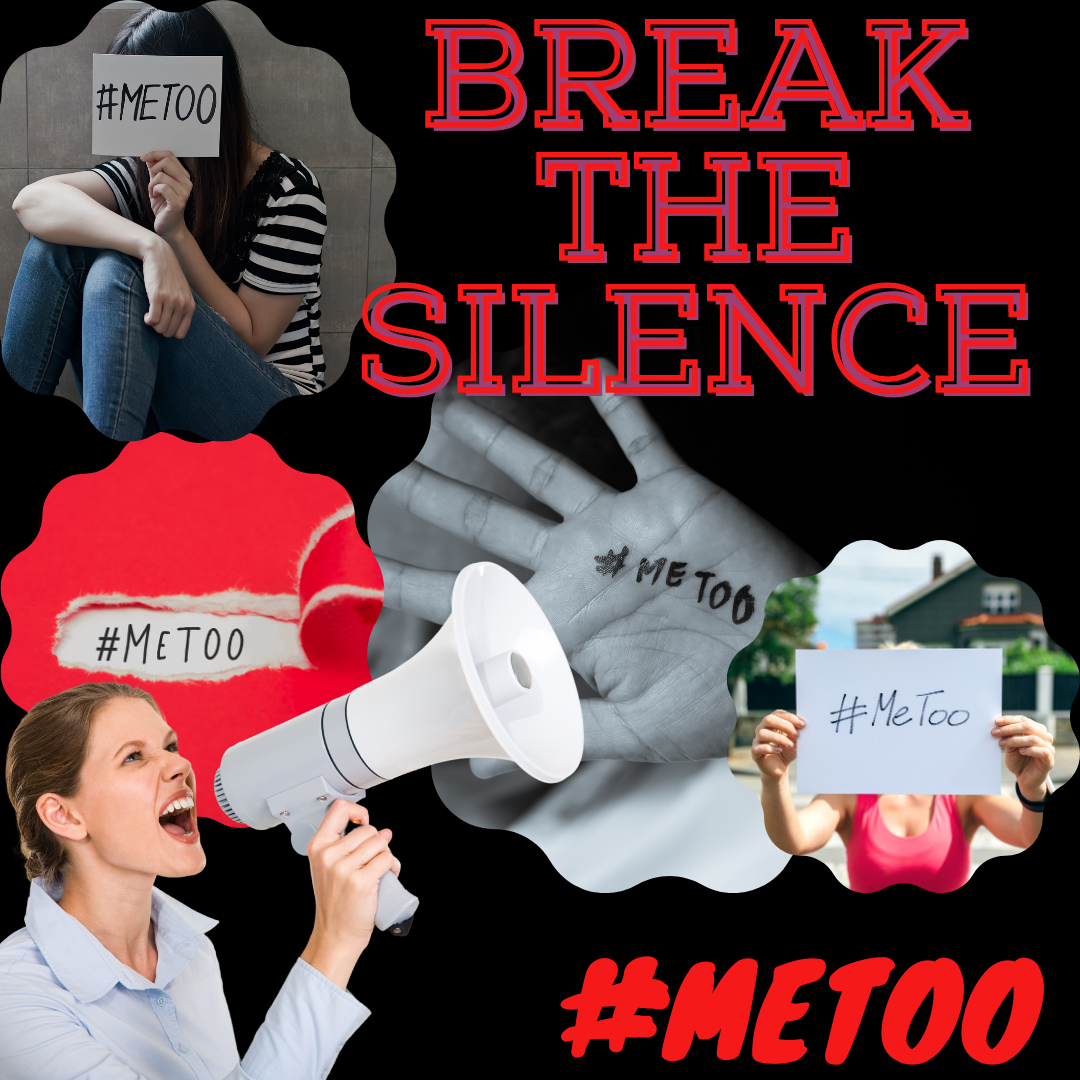
However, that can only happen when women (in the industry and beyond) collectively step into their true and authentic selves, and if WE are too afraid to do it, how can we ask anyone else to take that step?
This series is very personal for both of us. While planning and laboring over this series, Jayme and I had numerous conversations. We talked through the risks, the fears, the comedy, and the tragedy of it all. The hardest discussion, though, was trying to identify our WHY.
Why ARE we doing this? Why did two busy women (with careers, side hustles, households to support, and occasionally even social lives) decide to take time out of their already-hectic lives to research, interview, create graphics, sit on video calls for hours on end, and create content that has caused stress, anxiety, discomfort, lost sleep, tears, nausea… It’d be so much easier to relax on the couch and watch a sitcom!
Jayme’s reason boiled down to this:
My children are the reason for everything I do. As the mother of a son and a daughter, my ultimate purpose is to do what I can to create a world that is safer, better, for them to live in. My job is to protect them, and though I can’t control everything, I need to do what is possible.
The thought of someone treating my child (or anyone I love) in the way that these women have been treated – the idea of them going through that – is unimaginable. This is something I can do.
These topics are still grossly taboo, and the needle needs to move. I can use my community, my skills, my network, my voice, and my passion to do my part – to try to make a difference. This is something I can do.
I’ve dealt with and seen these issues my entire career, and I’ll be damned if my children have to go through the same thing; it’s one thing to hurt me, but it’s another entirely if you hurt my child. But speaking up against injustice sets the right example for my kids. This is something I can do.
Maybe, just maybe, by using my platform, my voice, I can help a woman. Help her prevent a situation or help her understand how to confront it. Maybe this series helps a man understand that the most dangerous thing is silence, and he becomes an ally, speaking up against those other men AND women who verbalize their misogyny. This is something WE can do.
“It is not the intelligent woman v. the ignorant woman; nor the white woman v. the black, the brown, and the red, it is not even the cause of woman v. man. Nay, ‘tis woman’s strongest vindication for speaking that the world needs to hear her voice.”
For me, this is a topic that’s been on my mind for a while – not just in the automotive industry but in general. It’s something I’ve dealt with my entire life – being told what I could do, how to act, what to say, how to dress, how to look and so on (and on, and on, and on…since 1985).
Like Jayme said, you can hurt me, but there will be hell to pay if you hurt my child. I am not a mother, but I have many children who I consider to be “mine:” nephews and nieces, a bonus kid and 14 godchildren, 11 of whom are girls.
A thing happened a couple years ago to one of them. A thing that has happened to many women, and I’ve always known it was a lurking possibility (or probability actually), even when I was a girl. And though I’m not ready to go into detail, #metoo.
But it felt different when it happened to one of my girls. To find out that a man had put his hands on a child that I consider MINE to protect – twice. A 7-year-old girl, later a 13-year-old girl. A child. My child. I’ve never felt so much despair, so SO much despair. So helpless, hopeless. Why wasn’t I there? Or her mother, father, grandmother, brother, preacher, teacher, anyone else – why was she alone with a predator?
Then, I got scared. There are well over two dozen girls in my life – my bonus daughter, goddaughters, nieces, friend’s children, etc… Statistically, that means that at least four of them will have the same experience in their lifetime (source). How can that be the world we live in?
Finally, I got angry. And I’ve stayed angry as I’ve watched repeated assaults on equality, on women, on friends, on strangers. As my girls have told me about boys groping them at school, about teachers demeaning them, about men in their 30s and 40s asking teenagers on dates.
I’ve struggled to compose my thoughts, to express this outrage constructively, to speak with my voice. I’ve never had such a hard time writing anything, but I’m so glad that Jayme and I decided to collaborate on this. It’s scary, but her courage strengthens me.
For the first time in years, I feel like my voice could possibly do some good; I don’t feel helpless or hopeless. I feel empowered. And I hope you will too.
For too long, we’ve all been waiting – waiting for change, for progress, for permission, for leaders in the automotive industry (and in the world) to finally say, “Enough is enough!”
We’re ready for change NOW – change that benefits women, men, boys and girls – change that will make a better future for all of our children. We are stronger when we are undivided.
We hope that, through Dirty Little Secrets of the Automotive and Skills Trades Industries, we can provide women and men alike with the strength to give themselves permission and to find the courage to share their stories. We can make this industry a more diverse, equitable and inclusive place for everyone. This is something we can all do, together.

With hope and faith in a better future,
Chasidy & Jayme
*The views and opinions expressed in this blog series, Dirty Little Secrets of the Automotive & Skilled Trades Industries, are solely those of the authors – Chasidy Rae Sisk and Jayme Blasiman – and do not reflect the views, opinions or policies of any past, present or future employer, client or any other organization with which Jayme or Chasidy are affiliated.
**Identities of contributing professionals have been concealed to protect the innocent and subsequently the guilty. Provided ages are approximate.
***References to all individuals, organizations or concepts in this series are provided for informational purposes only. You should not rely upon any information or materials on these pages in making or refraining from making any specific business decision or other decisions. In most cases, we have no affiliation with those mentioned, but in all cases, no compensatory arrangement was made for the reference. Actually, we’re hoping they aren’t mad that we mentioned them! While we believe that these resources, individuals and organizations represent the traits that we admire, that belief is limited to our experience and exposure to them. We take no responsibility or liability for the conduct or content of those entities, their sites or any offerings made. Additionally, we make no warranty regarding any transactions, products or services executed through or by a third party. All such transactions are conducted entirely at your own risk. Any warranty provided in connection with any of these third party’s offerings or services will be solely provided through said third party, not through Femcanic Garage or Chasidy Rae Sisk Writing & Communications, LLC.
@ A note on Chasidy’s unfiltered thoughts: These are my gut reactions and the part of this collaboration that has given me the most hesitation. I rarely write in my voice – my projects require providing an objective viewpoint or assuming someone else’s voice, so I do my best to avoid interjecting myself into the story. That is not the case in Dirty Little Secrets… you’ll find glimpses of my beliefs pervading these blogs; however, this symbol and font indicates my overt interjections that are “me” at my rawest, most unfiltered and least PC. They are the thoughts you’d normally only be privy to if we were kicked back on my couch with a glass of wine in hand. So, while the professional wordsmith in me apologizes, the woman who believes in equality – well, she knows that my embarrassment is worthwhile if it makes just one person second-guess a previously unfair practice or belief. Thank you for tolerating my snark!
2025 update: Since Jayme and I first started this adventure in 2021, we have both had significant changes in our lives. My life changed completely the day my daughter was born, and as we revisit this series in preparation for this year’s Women’s History Month, I’ve occasionally added some additional thoughts that reflect where I’m at these days. Having a young daughter… well, it gives me a new perspective on the importance of this work and has increased my outrage in response to some of these ladies’ experiences. Because if someone treated my daughter this way? Hell hath no fury like a mama bear protecting her young.
“A woman painter? They must’ve hired you to paint the pink ones!”
“Female mechanics, huh? Must be tough times!”
“How do you like screwing for a living?” (as I was working under the hood of his F-150).
You should be at home; women have no place in the shop.”
“Are you a real tech? I didn’t know they had any women.”
Guys, we know you have questions – cheers 🥂 to that infamous female intuition! – so we’re going to take a stab at answering them here.
If the jobs are there, what’s stopping women from applying for them? That’s why we’re here – the dirtiest little secret of all. But it’s not really all that secret, is it? They are the buzzwords everywhere; they’re needed in every industry. Diversity. Equity. Inclusion. These are scary thoughts, but we promise to take it slow and break it down.
Diversity is just variety, and a little change never hurt anyone, right? Right. Equity means fair and impartial, easy enough. OK, and here’s the big one that we get stuck on. Inclusion is simply equal access to opportunities and resources. That’s it.
And let’s clear up one common misconception that’s pretty irking:

Including women doesn’t mean excluding men. The whole point of inclusion is INCLUDING EVERYONE, regardless of gender, race, religion, or anything else that is completely unrelated to someone’s ability to perform their job functions.
Well, my company has this covered – we hire women, and we treat our girls right! (+1 cool point if you recognize the subliminal sexism in this statement!)
You’re in the majority in that assumption. In fact, only 78% of men in the automotive industry believe that a lack of diversity, equity and inclusion “prevent people from considering a career in the automotive industry;” however, 64% of women disagree, making this the most common explanation they express for a lack of interest in automotive – more prohibitive than income, promotion opportunities, or any other dissuading factor (source).
But that’s just the perception, not the reality! She would tell me if…
If you’re still having doubts that you should be concerned about this issue, check out these stats:
When asked if they would stay in automotive if they were starting their career today, 45% of surveyed women said they would choose a different path (source). And unfortunately, she probably wouldn’t tell you if she’s uncomfortable or facing discrimination – although 90% of women indicate the industry’s bias towards men negatively impacts diversity (source), few women talk about the misogyny and sexism they’ve faced because they fear repercussions – demotions, unpleasant assignments or treatment, even job loss.
But if she talked, we’d listen. She just has to speak up!
Even speaking up can be an issue in the male-female dynamic. Women who express their discontent are generally dismissed, especially in situations when they are outnumbered by men.
Best case scenario: we’re accused of being emotional, bossy, too aggressive.
Worst case scenario: we are called a bitch, told to go bleed, even physically assaulted.
I’m feeling attacked here.
Welcome to our world! But seriously, buddy, we don’t think you’re a bad guy (🖎but if you ARE a misogynistic ass – fight me, my dude 🤷). Honestly, you’re probably a great friend, loving partner/parent, and maybe you even genuinely respect the women in your life. But you can’t know what you don’t know – you haven’t experienced the pains of being a woman any more than women have experienced the pain of being kicked in the ‘nads.
But seriously, aren’t things better? Have we made progress on equality? Sure! Thankfully, things ARE better than they were 50 years ago, 20 years ago, even 10 years ago.
But does that mean the problem is gone? Not yet.
If you install one or two tires on a car, how far will it go? Not very – but luckily, the automotive and skilled labor trades industries are pretty accustomed to constant technological advances, so we believe that you can translate that same diligence to social advances!
Welcome to the adventure!